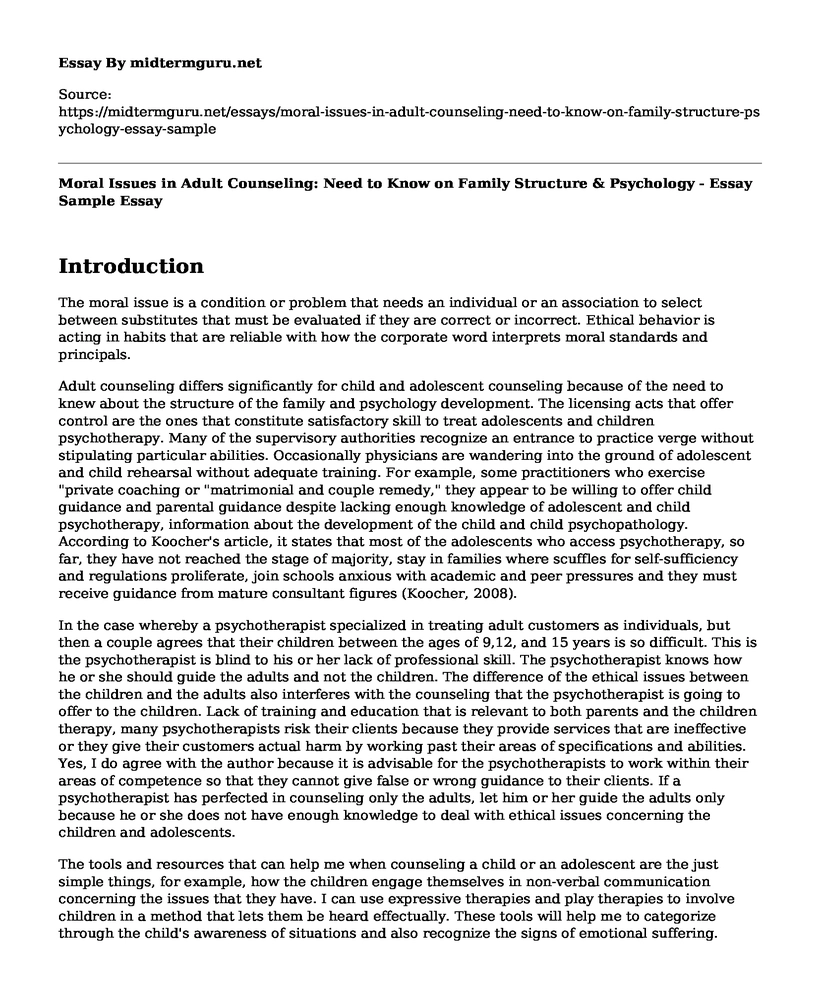Introduction
The moral issue is a condition or problem that needs an individual or an association to select between substitutes that must be evaluated if they are correct or incorrect. Ethical behavior is acting in habits that are reliable with how the corporate word interprets moral standards and principals.
Adult counseling differs significantly for child and adolescent counseling because of the need to knew about the structure of the family and psychology development. The licensing acts that offer control are the ones that constitute satisfactory skill to treat adolescents and children psychotherapy. Many of the supervisory authorities recognize an entrance to practice verge without stipulating particular abilities. Occasionally physicians are wandering into the ground of adolescent and child rehearsal without adequate training. For example, some practitioners who exercise "private coaching or "matrimonial and couple remedy," they appear to be willing to offer child guidance and parental guidance despite lacking enough knowledge of adolescent and child psychotherapy, information about the development of the child and child psychopathology. According to Koocher's article, it states that most of the adolescents who access psychotherapy, so far, they have not reached the stage of majority, stay in families where scuffles for self-sufficiency and regulations proliferate, join schools anxious with academic and peer pressures and they must receive guidance from mature consultant figures (Koocher, 2008).
In the case whereby a psychotherapist specialized in treating adult customers as individuals, but then a couple agrees that their children between the ages of 9,12, and 15 years is so difficult. This is the psychotherapist is blind to his or her lack of professional skill. The psychotherapist knows how he or she should guide the adults and not the children. The difference of the ethical issues between the children and the adults also interferes with the counseling that the psychotherapist is going to offer to the children. Lack of training and education that is relevant to both parents and the children therapy, many psychotherapists risk their clients because they provide services that are ineffective or they give their customers actual harm by working past their areas of specifications and abilities. Yes, I do agree with the author because it is advisable for the psychotherapists to work within their areas of competence so that they cannot give false or wrong guidance to their clients. If a psychotherapist has perfected in counseling only the adults, let him or her guide the adults only because he or she does not have enough knowledge to deal with ethical issues concerning the children and adolescents.
The tools and resources that can help me when counseling a child or an adolescent are the just simple things, for example, how the children engage themselves in non-verbal communication concerning the issues that they have. I can use expressive therapies and play therapies to involve children in a method that lets them be heard effectually. These tools will help me to categorize through the child's awareness of situations and also recognize the signs of emotional suffering. Through the study of pragmatic involvements, I can be able to perform analytical testing for academic and sensitive matters. When one focuses on stressors and the issues that face the teens or the adolescents, he or she can create effective relations, and they can help to solve the difficulties if they come up.
The cultural issues are related to professional matters because they can affect how a child is going to relate with people of other races or cultures when they are growing up. To perform efficiently, as an adolescent or a child, psychotherapist always involves the child's parents so that they can talk about their culture and to enable the child to understand fully about cultural beliefs so that the child cannot disrespect other people's perceptions. This allows the child to have good relationships with other people while he or she is growing up.
References
Koocher, G. P. (2008). Ethical challenges in mental health services to children and families. Journal of Clinical Psychology, 64(5), 601-612.
Cite this page
Moral Issues in Adult Counseling: Need to Know on Family Structure & Psychology - Essay Sample. (2023, Jan 12). Retrieved from https://midtermguru.com/essays/moral-issues-in-adult-counseling-need-to-know-on-family-structure-psychology-essay-sample
If you are the original author of this essay and no longer wish to have it published on the midtermguru.com website, please click below to request its removal:
- Misdiagnosis in Mental Health - Essay Example
- Feelings of Rejection - Assignment Example
- Article Analysis Essay on Racial Attitudes or Racial Ideology
- Essay Sample on Contemporary Body Image
- Factors That Cause Violent Crimes and Factors That Lowers Them - Essay Sample
- Non-Invasive BCI Systems: Feedback of Competent State - Essay Sample
- Exploring My Unconscious Racial Bias: Results From IAT Test - Essay Sample







